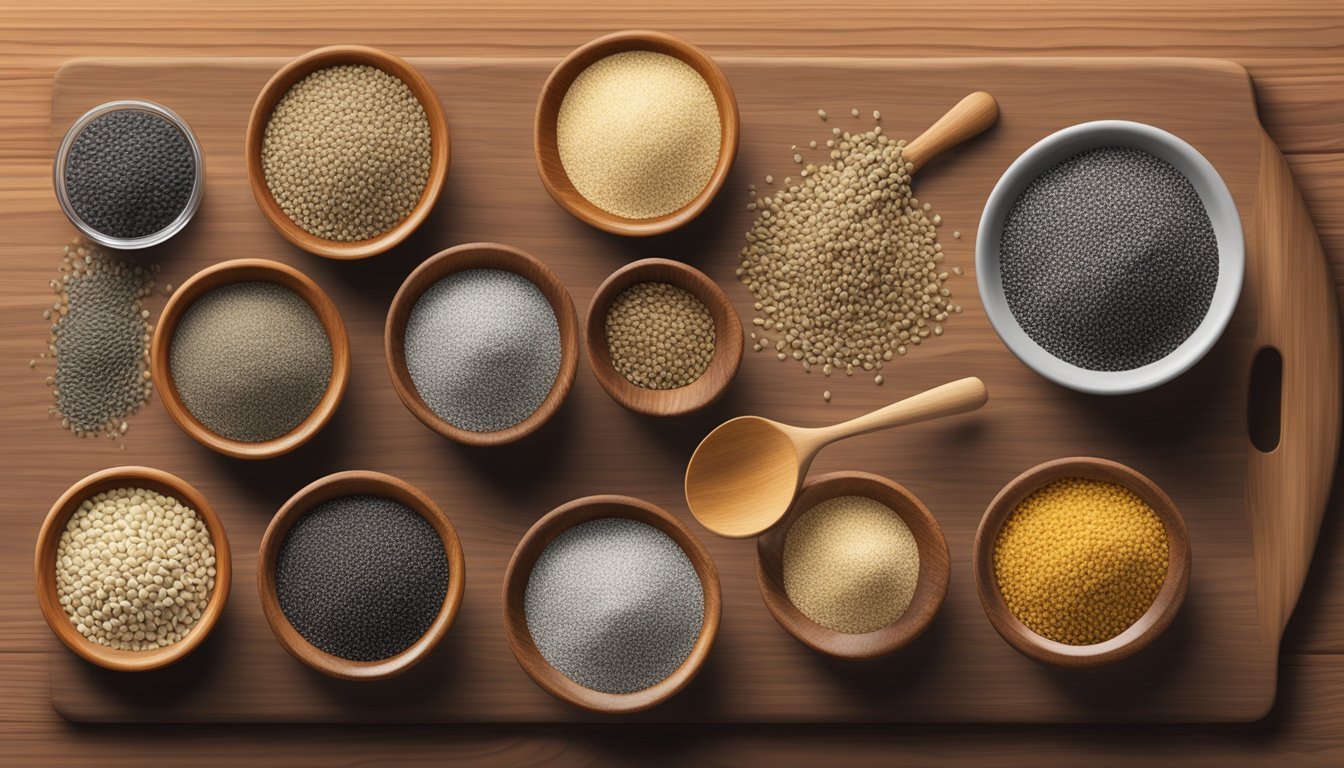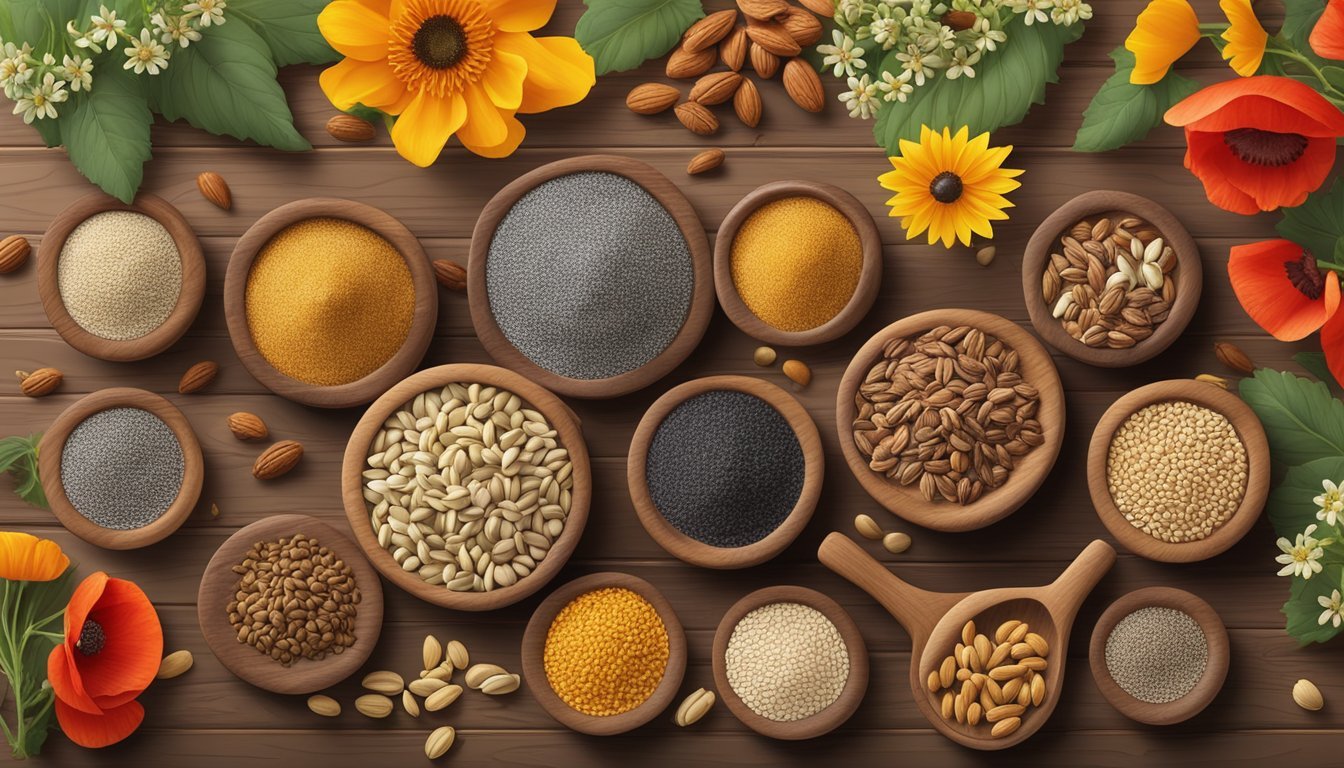Poppy Seed Substitutes
Best Alternatives for Baking and Cooking
Poppy seeds are a well-known ingredient prized for their nutty flavor and crunchy texture, commonly found sprinkled on breads, rolls, and incorporated into dressings and confections. Despite their small size, they pack a distinct boldness that enhances the gastronomic experience of many dishes. However, in instances where poppy seeds are unavailable or unfit for a diner's dietary restrictions, cooks and bakers may seek suitable substitutes that closely mimic the original's characteristics in both baking and cooking applications.
Substitutions come in a variety of options, each offering a distinct taste and texture profile that can complement the intended dish. For a nutty and crunchy alternative, black sesame seeds are often recommended for their larger size and slightly more pronounced flavor. Chia seeds, recognized for their similar appearance and nutritional value, can also replace poppy seeds but may necessitate adjustments to moisture levels in recipes due to their liquid-absorbing properties. Cumin seeds provide an earthy flavor that can be particularly well-suited for savory dishes in various cuisines. It is essential for culinary enthusiasts to consider the impact of these substitutes on the final dish, ensuring that the replacement harmonizes with the other ingredients without overpowering them.
Understanding Poppy Seeds
Poppy seeds are a versatile culinary ingredient, known for their rich nutrient profile and widespread use in various dishes across Europe and India. They are valued for contributing a crunchy texture and are often used as a garnish.
Nutritional Profile of Poppy Seeds
Poppy seeds boast a dense nutritional composition, rich in essential minerals and vitamins. A typical nutritional breakdown per tablespoon (approx. 9 grams) is as follows:
Calories: 46
Protein: 1.6 grams
Fat: 3.7 grams
Dietary Fiber: 1.7 grams
Calcium: 126 milligrams (mg)
Magnesium: 23.76 mg
Iron: 0.79 mg
Zinc: 0.68 mg
Copper: 0.08 mg
Manganese: 0.24 mg
Phosphorus: 85.95 mg
Additionally, poppy seeds contain antioxidants that may contribute to better health. Incorporating poppy seeds into one's diet can aid in the intake of these important vitamins and minerals.
Culinary Uses of Poppy Seeds
In the realm of cooking, poppy seeds are celebrated for their ability to enhance both savory dishes and sweet baked goods. They are a staple in European baked items such as muffins, cakes, and pastries and play a significant role in Indian cuisine, often found in sauces, curries, and salad dressings. The seeds add not only a pleasant, mildly nutty flavor but also a visually appealing speckled appearance to dishes.
One should note that poppy seeds impart more than just flavor; their crunchy texture is highly valued by chefs, especially as a garnish that offers both taste and an attractive visual contrast. Whether incorporated within a recipe or sprinkled on top, poppy seeds are a small yet impactful component in a wide array of culinary creations.
Why Substitute Poppy Seeds?
Choosing an alternative to poppy seeds stems from various personal and practical considerations, from allergic reactions to dietary choices and even drug testing protocols. Here, we explore the intrinsic reasons influencing individuals to seek poppy seed substitutes.
Allergies and Sensitivities
Some individuals experience allergies or sensitivities to poppy seeds, which can manifest as skin rashes, respiratory issues, or gastrointestinal discomfort. As health concerns take precedence, finding a substitute that doesn't compromise taste or texture becomes a priority for those affected.
Availability and Cost
Poppy seeds might not be readily available in every location, or their cost may be prohibitive for some. When the expense or logistics of obtaining poppy seeds are not feasible, cooks often look for less expensive, more accessible alternatives that provide a similar flavor profile.
Dietary Restrictions
Those adhering to specific dietary restrictions, such as vegan or gluten-free lifestyles, may opt for substitutes that align with their nutrition choices. Certain poppy seed alternatives can offer comparable taste without conflicting with these dietary practices.
Drug Testing Concerns
Since poppy seeds naturally contain traces of opium, which is processed out of opium poppy plants, they can lead to false positives on drug tests. To avoid this risk, especially for those subject to routine drug screenings, utilizing a different ingredient is a sensible solution.
Popular Poppy Seed Substitutes
When seeking alternatives to poppy seeds, it is essential to consider factors like texture, nutritional value, and flavor profiles. Several seeds can act as effective substitutes, offering a variety of benefits from enhanced nutrition to a similar crunch in culinary applications.
Sesame Seeds
Sesame seeds are one of the most commonly recommended alternatives for poppy seeds. They come in two main varieties:
Black Sesame Seeds: With a slightly stronger, nuttier flavor, black sesame seeds make an excellent 1:1 substitute for poppy seeds in recipes.
White Sesame Seeds: These are milder and can be used similarly to black sesame seeds. Toasting them can enhance their flavor, bringing them closer to the profile of poppy seeds.
Both types contribute a desirable crunch to dishes and can be used in baking and cooking seamlessly.
Chia Seeds
Chia seeds stand out due to their rich omega-3 fatty acids and fiber content, boosting the nutritional value of meals. They share a similar size and texture with poppy seeds and can be used as a 1:1 substitute in most recipes. However, chia seeds have the ability to absorb liquid, so one might consider adding a bit more liquid to the recipe to maintain the desired consistency.
Flax Seeds
Another healthy alternative to poppy seeds is flax seeds. Packed with omega-3s, these seeds offer numerous health benefits. They can be ground or used whole, depending on the texture desired in the baking or cooking process. Flax seeds have a mild, nutty flavor and can also serve as a 1:1 substitute for poppy seeds.
Hemp Seeds
Hemp seeds are a powerhouse of proteins and healthy fats. While they do not replicate the exact texture or taste of poppy seeds, their subtle, nutty flavor makes them a versatile ingredient in the kitchen. Hemp seeds can be sprinkled over salads, incorporated into baked goods, or used as a topping to add a nutritious crunch.
Cultural Substitutes for Flavor
When seeking poppy seed substitutes, culinary choices often draw from a wealth of cultural ingredients. They bring unique textures and aromas, fitting seamlessly into various cuisines and dishes.
Nigella Seeds
Nigella seeds, also known as black cumin or kalonji, are a treasured spice in Indian cuisine. They impart an earthy flavor with a hint of bitterness and a crunchy texture. Their pungent aroma is a staple in Indian breads, like naan, and they are celebrated for their versatility in savory and sweet applications alike.
Caraway Seeds
A familiar spice in European cuisine, caraway seeds possess a distinct anise-like flavor. Their aroma is warm and slightly peppery, adding a complex note to breads, cheeses, and meat dishes. Caraway seeds have a shape similar to poppy seeds and complement rye bread exceptionally well, providing a crunchy texture and robust taste.
Cumin and Fennel Seeds
Cumin and fennel seeds share a place of prominence in Indian cuisine. They offer flavors that range from warm and earthy for cumin to mildly sweet and licorice-like for fennel. These seeds are frequently used to season dishes, imparting their bold personality and a delectable aroma that elevates the overall taste.
Cumin Seeds: Rich and warm flavor profile, adds granular texture.
Fennel Seeds: Slightly sweet, anise-like flavor, with a softer crunch.
Other Alternative Seeds and Nuts
When seeking substitutes for poppy seeds, certain seeds and nuts stand out, not only for their similar texture and ability to add crunch but also for their distinct nutritional profiles. These alternatives can provide a range of flavors while contributing to the nutritional value of dishes.
Pumpkin Seeds
Pumpkin seeds, also known as pepitas, offer a robust flavor and a crunchy texture that can mimic poppy seeds in various recipes. These seeds are a good source of magnesium, with around 156 mg in a one-ounce serving. They are also versatile and can be sprinkled on salads or baked goods.
Nutritional profile: High in magnesium and potassium
Uses: Versatile in snacks and baked items
Texture: Satisfying crunch
Sunflower Seeds
Sunflower seeds are another excellent alternative with a satisfying crunch that can replace poppy seeds in numerous dishes. These seeds have a mild, nutty flavor and are loaded with vitamin E and fiber. They excel as salad toppings or in homemade trail mixes as a snack.
Nutritional profile: Rich in vitamin E and fiber
Uses: Ideal for snacks and as salad toppings
Texture: Provides a pleasant crunch
Amaranth
While not a seed per se, amaranth grains can act as a poppy seed substitute. It is notably high in protein and fiber, boasting a unique crunch when toasted. Amaranth's nutritional profile is impressive, offering 9 grams of protein per cup. It can serve as a binder in recipes due to its slightly gelatinous quality when soaked.
Nutritional profile: Excellent source of protein and fiber
Uses: Good for baking and as a thickener
Texture: Crunchy when toasted, gelatinous when soaked
Considerations When Choosing Substitutes
When selecting a substitute for poppy seeds, one must consider how the alternative will interact with the other ingredients in terms of taste and texture, as well as its nutritional implications. Moreover, one may need to modify cooking or baking techniques to achieve the desired outcome with the new ingredient.
Taste and Texture Compatibility
An ideal substitute should closely mimic the sensory attributes of poppy seeds. These small, crunchy seeds impart a nutty flavor and texture to dishes.
Sesame Seeds: Offer a similar crunch with a mildly nutty taste.
Chia Seeds: Provide a comparable texture and can also create a gel-like consistency when soaked, impacting the dish's moisture content.
Nutritional Considerations
The nutritional value of the substitute could influence the health benefits of a dish, catering to different dietary needs.
Chia Seeds: Offer a high fiber content, along with omega-3 fatty acids, supporting digestion and heart health.
Hemp Seeds: Rich in minerals such as iron and calcium, beneficial for those looking to boost their intake of these nutrients.
Cooking and Baking Adjustments
Incorporating an alternative to poppy seeds may require specific cooking adjustments for optimal results.
Heat Sensitivity: Some substitutes, like hemp seeds, may have different heat tolerances, affecting their culinary uses.
Hydration: Ingredients like chia seeds absorb more liquid, potentially necessitating alterations in baking recipes to maintain the desired consistency.
Frequently Asked Questions
This section addresses common concerns about substituting poppy seeds in cooking, focusing on drug interactions, how much to use for replacements, and the effects on a dish's appearance and flavor.
Interactions with Drugs and Health
Poppy seeds can cause false positives in drug tests due to traces of opiates. Substitutes like chia seeds or flax seeds do not contain opiates and thus do not present such issues. However, one should remain mindful of allergies and individual health concerns when selecting a substitute.
Substitution Ratios and Measurements
For a 1:1 substitute in recipes calling for poppy seeds, one can generally use the same measurements for substitutes like chia or sesame seeds. To illustrate:
Chia seeds: 1 tablespoon poppy seeds = 1 tablespoon chia seeds (Add an extra tablespoon of liquid to the recipe to compensate for chia seeds' higher absorption rate.)
Sesame seeds: Use an equal amount, but consider toasting them first to bring out a nuttier flavor.
Impact on Final Dish Appearance and Flavor
Substitutes may alter the appearance and flavor profile of a dish. Here's what to expect:
Appearance: Black sesame seeds offer a visually similar appearance. Chia seeds, being smaller, could result in a less dotted look.
Flavor: Expect a slight change; for instance, sesame seeds are nuttier, while basil seeds impart a mild, floral note. These changes are typically subtle and rarely overpower the main flavors of a dish.







